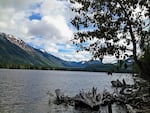
The view of Bumping Lake from the bank near Chris Maykut's cabin. A Yakima Basin water plan aims to enlarge the central Washington lake. That would flood a small, shoreline community.
Courtney Flatt
A warming climate is making water more scarce in places that rely on runoff from mountain snowpack -- places like the Yakima River basin in Central Washington.
That’s why a group of about 20 stakeholders have come together to develop a plan to help manage water in this agricultural center. Those stakeholders traditionally haven’t gotten along: environmentalists, farmers, the Yakama Nation tribal leaders, and government officials.
"The era of fighting water issues to a standstill must end, given the pressing threats to ecosystems and water supplies," said Michael Garrity, the director of conservation in the Puget Sound and Columbia Basin for American Rivers.
The plan would take 30 years and cost roughly $4 billion. It would improve fish passage, enlarge several reservoirs, recharge groundwater, and improve habitat.
U.S. Sen. Maria Cantwell, D-Wash., has introduced a bill that would authorize the first stage of the plan. No federal funding amount has been set yet. Washington Gov. Jay Inslee in 2013 authorized the state to fund up to half the total price tag.
The first stage is expected to cost about $900 million.
The bill received its first hearing Tuesday in the Senate Energy and Natural Resources Committee.
"We face tremendous risks due to drought, and we need to make investments now. This plan is identifying the activities and how we're going to fund them in partnership to build resilience to drought, and there's a lot of risk if we do nothing," Tom Iseman, deputy assistant secretary for the U.S. Department of Interior, told the committee.
Fish face a major part of that risk, said Phil Rigdon, with the Yakama Nation Department of Natural Resources.
"The spirit of cooperation of the Yakima Basin Integrated Management Plan gives us hope going forward to see full restoration of salmon runs and other natural resources vital to the Yakama peoples' needs," Rigdon said.
One of the main things needed for the plan, supporters said, is increased reservoir storage to help provide water when the mountains don't have enough snowpack.
"The objectives of the integrated management plan cannot be met without significant improvements in water storage," said Derek Sandison, the former director of the Washington Department of Ecology's Office of Columbia River.
All speaking at the hearing supported the water management plan — a few did say the bill needed some changes. But the plan has faced opposition at home, mainly from cabin owners surrounding Bumping Lake and Lake Kachess and the Sierra Club.
Lakefront cabin owners say their buildings would be flooded if reservoir capacity is expanded. Instead of expanding water storage at the lake, they want to prioritize where water goes -- continuing to use it to irrigate high-value crops but limiting how much goes to low-value ones, said Jay Schwartz, with the group Friends of Lake Kachess.
"The economics of this plan are just bad," Schwartz said. "And at some point gravity will bring those to the front of the discussion. … It's the taxpayer that's sitting there paying for it, and it's the homeowners on these lakes that have been excluded from the process that have no voice yet."
The first phase of the plan before Congress would increase water storage at Lake Kachess and build a pipeline to transfer water between Lake Kachess and Keechelus. It would also create fish passage at Lake Cle Elum and habitat restoration projects.

